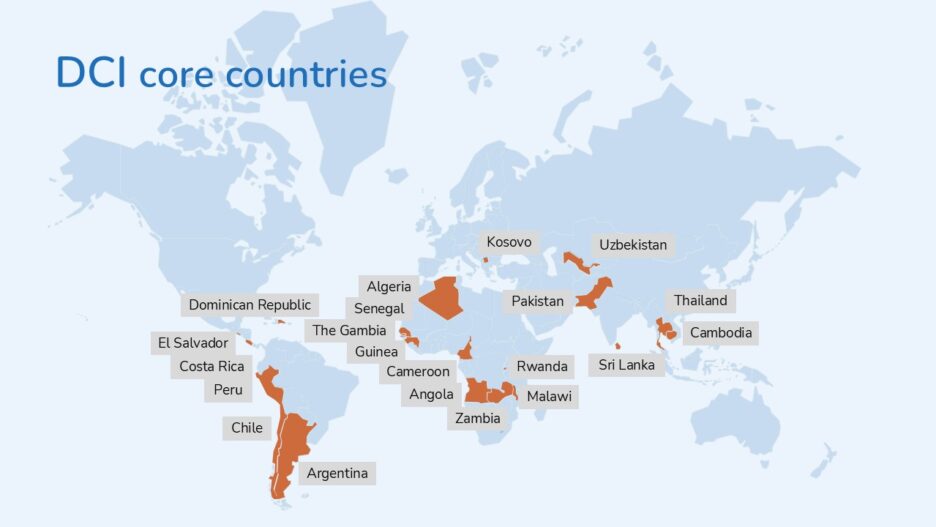Across 21 countries, a shared journey toward inclusive and digital social protection

Around the globe, countries are stepping up efforts to digitalise their social protection systems, yielding faster access to services and improving efficiency, transparency, and inclusiveness, particularly for vulnerable groups. However, this transformation is often hindered by challenges—ranging from fragmented IT infrastructure and poor interoperability to limited internal technical capacity and a lack of strategic direction.
The Digital Convergence Initiative (DCI) brings a fresh approach, providing technical and financial support, as well as a collaborative implementation model. Key partners support countries based on existing partnerships with governments, including: World Bank (Angola, Malawi, Argentina, El Salvador, Cameroon, Algeria, Kosovo, Sri Lanka, Thailand, The Gambia and Guinea), GIZ (Rwanda, Uzbekistan, Cambodia, and Peru), FIAP (Chile and Costa Rica), Expertise France (Senegal and Dominican Republic), and ILO (Zambia and Pakistan). Together, these efforts span 21 countries at different stages of digital transformation—each confronting unique challenges, but also sharing common aspirations for building adaptive, inclusive, and resilient digital social protection systems.
Taken together, these experiences reveal shared systemic constraints, as well as emerging strategic opportunities for accelerating digital transformation—critical steps on the path toward realising universal social protection by 2030.
Diagnostics as a starting point
Critical to the digital transformation of social protection systems is diagnostics. Countries such as Guinea, Algeria, Kosovo, Sri Lanka, Cameroon, Angola, and The Gambia are applying structured assessments like the Social Protection Assessment Resource Kit for Systems (SPARKS) and its IT module (SPARKS-IT), developed by the World Bank drawing on its more than two decades of experience in delivery systems. These tools are comprehensive, yet adaptable to country contexts, and are being deployed to map delivery systems, business processes, and IT infrastructure and to identify strengths and challenges across the delivery chain. Countries such as Senegal, Rwanda, Pakistan and Peru are using tailored diagnostic approaches to address specific challenges.
In Peru, diagnostics evaluate the interoperability between Juntos (a conditional cash transfer program) and the targeting office (OFIS) systems, covering processes, technologies, security, access control, regulatory compliance, and the overall level of integration between the systems.
In Senegal, the focus is on developing specifications for overhauling the country’s Single National Register (RNU), including infrastructure upgrades, performance improvements and new features to enhance usability.
In Pakistan, the technical assessment gathers detailed information from 12 departments delivering social protection in Khyber Pakhtunkhwa province, with the aim of integrating their MISs into a centralised platform—the Integrated Social Protection Information System (I/SP-IS), managed by the Social Protection Reforms Unit.
Rwanda is working on a digital social protection architecture blueprint, which will catalogue and map existing and planned data systems, identify gaps, and propose an interoperability plan aligned with national frameworks. These diagnostics ensure that digital transformation is grounded in evidence and stakeholder ownership, setting the stage for well-prioritised investments.
Interoperability – the backbone of digital transformation
Nearly every country has prioritised interoperability. Governments are working to connect systems that have historically operated in silos, enabling secure and efficient data exchange.
Costa Rica is implementing an Interoperability Master Plan to align its National System of Information and Single Registry of State Beneficiaries (SINIRUBE) with national governance frameworks.
Rwanda is integrating multiple government databases into a unified social registry.
Senegal and Zambia are linking social protection with health systems to better serve vulnerable populations.
Kosovo is working on developing its Social Welfare Information System (SWIS) and Dynamic Social Registry (DSR) to make the systems interoperable with each other, as well as with the national eKosova platform.
Cameroon is advancing towards full interoperability of its national social protection systems, beginning with an assessment of key information systems—such as the Common ID System, Civil Registration System and the Disability Registry—to explore their potential integration with the Unified Social Registry (RESUC) Management Information System (MIS). Furthermore, a feasibility study is underway to design an integrated digital payment platform that would connect the MIS with payment service providers.
Without interoperability, countries recognise that digital tools risk remaining fragmented and underutilised. DCI is leading the development of technical interoperability standards that enable social protection programmes to exchange data and integrate systems, strengthening the delivery of social protection.
Strengthening social protection – next-generation information systems
Governments across multiple countries are prioritising the development and strengthening of information systems to enhance the delivery and coordination of social protection.
In Guinea, DCI is supporting the National Agency for Economic and Social Inclusion (ANIES) to deploy CoreMIS (powered by openIMIS), as the central beneficiary and operations management system for the Nafa (cash transfer) programme, ensuring interoperability with the Unified Social Registry.
Algeria is advancing the functional model of the Cash Transfer Compensation Program (CTCP) MIS by developing modules for payments, monitoring, and grievance management, complemented by a real-time dashboard and a public-facing portal.
In The Gambia, efforts are focused on transitioning the social registry (GamSR) into a dynamic platform, including a feasibility study on migrating to an open-source MIS.
Senegal is customising and deploying openIMIS to digitalise and streamline relationships between mutual health insurance funds and healthcare providers under compulsory health insurance.
Zambia is working to build a more robust and interoperable MIS at the National Health Insurance Authority (NHIMA) to improve integration and system performance.
Strong focus on citizen engagement
A strong focus on citizen engagement, grievance redressal, and case management has emerged as a defining feature of digital transformation in social protection. These elements are critical for ensuring that programmes not only deliver benefits but also respond to the evolving needs of citizens in a timely and dignified manner.
In Sri Lanka, the government is designing a case management information system that equips community workers with digital tools to support families through tailored development plans. This approach enables more personalised service delivery, ensuring that interventions are better aligned with household needs.
In Cambodia, efforts to improve the Digital Social Protection Platform have centred on harmonising grievance and feedback systems across programmes to streamline citizen interaction with the state, making services more responsive and transparent.
In Peru, upgrades to the MIJUNTOS mobile app will allow beneficiaries to lodge grievances directly through their phone, while enabling local offices to manage intake and resolution more efficiently.
Enabling responsible use of AI
As governments increasingly explore AI-powered tools to strengthen delivery across the social protection chain, the importance of responsible AI governance and citizen-centred design is becoming paramount. DCI is supporting countries in piloting frontier solutions such as AI chatbots and automated screening tools, while also ensuring that safeguards for transparency, explainability and ethical use are embedded from the outset.
In Uzbekistan, a multilingual Retrieval-Augmented Generation (RAG) chatbot is being developed to help citizens lodge grievances or access programme information through both voice and text. With DCI’s support, the government is aligning this innovation with its broader Digital Uzbekistan 2030 strategy and emerging AI governance frameworks.
In Angola, biometric tools and AI-driven validation are being piloted to strengthen registration processes and payments.
Cambodia and Rwanda are conducting use case scoping to identify where along the delivery chain AI can most effectively add value, particularly in enhancing data quality and strengthening service delivery.
Advancing data systems and analytics
Across Thailand, Chile and Costa Rica, efforts are underway to strengthen the role of data, analytics, and quality assurance in social protection.
In Thailand, the focus is on establishing a federated data warehouse and developing an analytics dashboard prototype to enable evidence-based policymaking through tools such as beneficiary profiling, payment monitoring, expenditure tracking, and the detection of welfare blind spots.
In Chile, a data warehouse for National Service for the Elderly (SENAMA) is being developed to analyse large volumes of information, supporting strategic management, supply-demand studies, improved programme design, and stronger coordination with other actors.
Costa Rica is prioritising data quality, privacy, and security, aligning SINIRUBE with international standards by certifying operating processes under ISO 9001.
Together, these initiatives highlight how data systems, quality assurance, and advanced analytics are building responsive and effective social protection systems.
Building capacity for long-term systems change
Countries also recognise that technology must be complemented by strong institutional capacity and robust governance frameworks.
In Pakistan’s Khyber Pakhtunkhwa province, DCI is supporting efforts to align social protection data systems across provincial and federal levels, underpinned by legal and policy frameworks that promote interoperability.
In Costa Rica, work is underway to strengthen governance and update protocols for SINIRUBE, by clearly defining institutional roles and enforcement mechanisms, ensuring that agencies contribute timely and accurate data to the central system.
More broadly, DCI is investing in capacity building through curated, in-country and global training programmes on digital social protection systems. ILO is leading the development of a comprehensive capacity-building framework that spans foundational, technical and managerial competencies. Government staff across 21 and many more countries will benefit from these tailored trainings. To further enhance accessibility and impact, ILO is also designing a self-paced e-learning course, making knowledge on digital transformation and interoperability in social protection widely available to practitioners, policymakers and other interested stakeholders.
Additionally, DCI ensures that knowledge and experiences on the digital transformation of social protection systems are systematically documented and widely shared. DCI’s website hosts event recordings, publications, blogs, and other resources. Upcoming knowledge products include case studies on data governance and interoperability, as well as guidance on safeguards for responsible digitalisation. DCI also facilitates capacity building through webinars like ‘Talking Interoperability’ and country convenings that foster peer learning and exchange.
A global initiative, grounded in local contexts
The 21 countries currently working with DCI reflect the diversity of pathways in digital social protection—ranging from building foundational registries to piloting AI solutions. What unites them is a shared ambition to create systems that are more resilient, inclusive and future-ready. DCI’s country-led, partner-driven and globally informed approach ensures that global knowledge is adapted to local realities, while lessons and innovations from implementation are shared widely with the broader social protection community.
DCI also offers on-demand Helpdesk support, consisting of targeted, time-bound advisory services to help governments overcome challenges such as:
- fragmented IT infrastructure
- limited interoperability
- scarce technical expertise
National and subnational authorities can request assistance, with priority given to countries where DCI partners are active. To request support, simply complete the request form and send it to contact@spdci.org, or reach out to us directly for more information.
Author: Sarang Chaudhary
